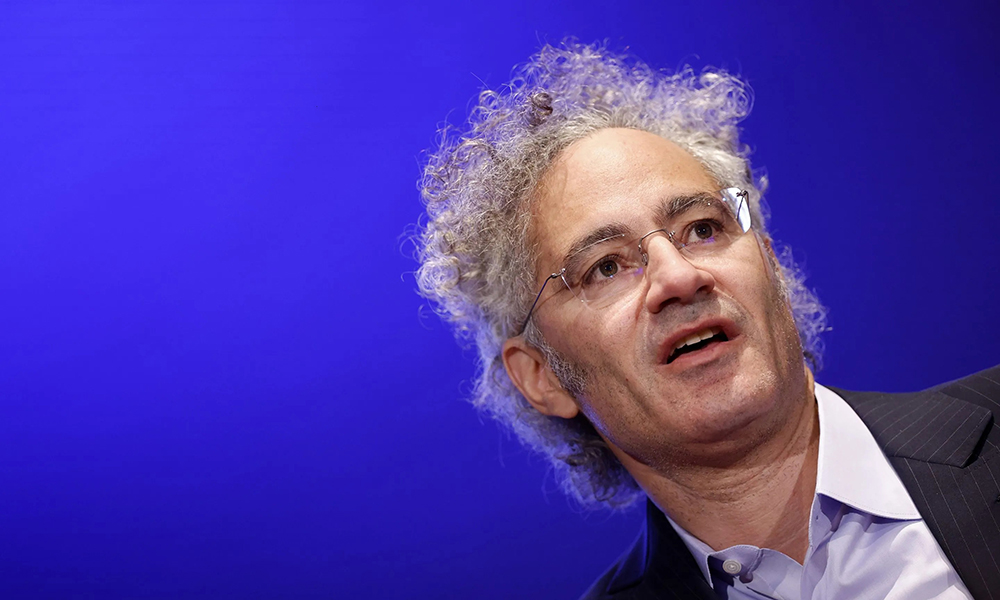
? AI是否會造成大范圍失業(yè),,已成為近年來的一個(gè)熱門話題。近日,, Palantir公司CEO亞歷克斯?卡爾普表示,,他相信AI可以給總體就業(yè)市場帶來增量效益,但前提時(shí)“我們要非常努力地去實(shí)現(xiàn)這個(gè)目標(biāo)”。他還警告道,,如果全行業(yè)不向著這個(gè)目標(biāo)努力,,全社會或?qū)⒚媾R很多精英都未曾料及的“深刻社會動蕩”。現(xiàn)在已有跡象表明,,AI正在取代大量初級工作崗位,。
Palantir公司的CEO亞歷克斯?卡爾普是當(dāng)前AI革命的最大受益者之一。不過就連他也在最近接受采訪時(shí)表示,,如果AI行業(yè)不想方設(shè)法加以防范,,AI很可能會給全社會造成巨大撕裂。
上周四,,卡爾普在接受CNBC采訪時(shí),,記者問他怎么看待AI對就業(yè)的影響。
卡爾普答道:“作為科技從業(yè)者,,我們不能對AI有可能給普通人造成的影響漠不關(guān)心,。”
現(xiàn)在,,AI已經(jīng)被廣大職場人應(yīng)用到了工作的方方面面,,它也大大提升了人們的生產(chǎn)力和工作效率。但與此同時(shí),,也有跡象表明,,AI的出現(xiàn),使得市場上對初級崗位的招聘需求出現(xiàn)了一定的萎縮,。而這些初級崗位往往是年輕人步入社會的第一道階梯,。
與此同時(shí),Palantir公司一直走在企業(yè)級AI應(yīng)用的前沿,。它的AI平臺主要用于國防和情報(bào)領(lǐng)域,,同時(shí)它也在不斷擴(kuò)展商用市場。最近,,它就與一家醫(yī)院和醫(yī)療系統(tǒng)運(yùn)營平臺提供商TeleTracking達(dá)成了合作,。
卡爾普在上周四接受采訪時(shí)表示,Palantir公司開發(fā)的AI應(yīng)用“可以對美國勞動力市場產(chǎn)生增量效果,,”不過前提是“我們得非常非常努力地去做這件事,。”
他強(qiáng)調(diào),,“可以產(chǎn)生”增量效果,,并不意味著“一定會產(chǎn)生”。這需要全行業(yè)的共同努力,。
卡爾普表示:“我們必須朝著這個(gè)方向努力,,否則我們有可能要面臨一場深刻的社會動蕩,,而且我認(rèn)為,現(xiàn)在許多社會精英都忽視了這種可能性,?!?/p>
作為一個(gè)AI領(lǐng)域的領(lǐng)導(dǎo)者,卡爾普的話無疑是值得關(guān)注的,。他此前也曾呼吁科技行業(yè)著手解決一些重大問題,。
比如最近,卡爾普在《大西洋月刊》上發(fā)表了一篇文章,,文章改編自他與Palantir公司企業(yè)事務(wù)負(fù)責(zé)人兼法務(wù)總顧問尼古拉斯?扎米斯卡合著的新書《技術(shù)共和國》,。他在文中批評硅谷只知道“把精力放在那些能解決的瑣碎問題上”,而放棄了與政府合作,,解決其他更迫切的全國性問題的優(yōu)良傳統(tǒng),。
最近,AI領(lǐng)域的其他知名人士也表示,,AI很可能會對勞動力市場造成嚴(yán)峻沖擊,。比如上個(gè)月,Anthropic公司CEO達(dá)里奧·阿莫代伊就指出,,AI很有可能會徹底取代50%的入門級白領(lǐng)工作,。
在接受新聞網(wǎng)站Axios采訪時(shí),阿莫代伊指出,,AI很有可能導(dǎo)致總失業(yè)率飆升10%到20%,。而美國上周五最新公布的宏觀失業(yè)率為4.2%。
阿莫代伊表示:“大多數(shù)人都沒有意識到將要發(fā)生什么,。這件事聽起來非常瘋狂,,人們根本不相信……但是作為這項(xiàng)技術(shù)的創(chuàng)造者,我們有責(zé)任和義務(wù)告訴大家將要發(fā)生的事情,?!?/p>
OpenAI公司CEO山姆·奧特曼上周也曾說過,他覺得AI現(xiàn)在起的作用不亞于一個(gè)實(shí)習(xí)生,。他還認(rèn)為,,到了明年,AI就可以“幫助我們發(fā)現(xiàn)新知識,,或者幫我們找到比較重要和復(fù)雜的商業(yè)問題的解決方案”,。
同時(shí),英偉達(dá)公司CEO黃仁勛上個(gè)月也在米爾肯研究所全球大會上表示,,雖然他不認(rèn)為勞動者會因?yàn)锳I而失業(yè),,但是有人確實(shí)會因?yàn)椤皠e的某個(gè)人會使用 AI”而失業(yè)。(財(cái)富中文網(wǎng))
譯者:樸成奎
? AI是否會造成大范圍失業(yè),,已成為近年來的一個(gè)熱門話題,。近日,, Palantir公司CEO亞歷克斯?卡爾普表示,他相信AI可以給總體就業(yè)市場帶來增量效益,,但前提時(shí)“我們要非常努力地去實(shí)現(xiàn)這個(gè)目標(biāo)”。他還警告道,,如果全行業(yè)不向著這個(gè)目標(biāo)努力,,全社會或?qū)⒚媾R很多精英都未曾料及的“深刻社會動蕩”。現(xiàn)在已有跡象表明,,AI正在取代大量初級工作崗位,。
Palantir公司的CEO亞歷克斯?卡爾普是當(dāng)前AI革命的最大受益者之一。不過就連他也在最近接受采訪時(shí)表示,,如果AI行業(yè)不想方設(shè)法加以防范,,AI很可能會給全社會造成巨大撕裂。
上周四,,卡爾普在接受CNBC采訪時(shí),,記者問他怎么看待AI對就業(yè)的影響。
卡爾普答道:“作為科技從業(yè)者,,我們不能對AI有可能給普通人造成的影響漠不關(guān)心,。”
現(xiàn)在,,AI已經(jīng)被廣大職場人應(yīng)用到了工作的方方面面,,它也大大提升了人們的生產(chǎn)力和工作效率。但與此同時(shí),,也有跡象表明,,AI的出現(xiàn),使得市場上對初級崗位的招聘需求出現(xiàn)了一定的萎縮,。而這些初級崗位往往是年輕人步入社會的第一道階梯,。
與此同時(shí),Palantir公司一直走在企業(yè)級AI應(yīng)用的前沿,。它的AI平臺主要用于國防和情報(bào)領(lǐng)域,,同時(shí)它也在不斷擴(kuò)展商用市場。最近,,它就與一家醫(yī)院和醫(yī)療系統(tǒng)運(yùn)營平臺提供商TeleTracking達(dá)成了合作,。
卡爾普在上周四接受采訪時(shí)表示,Palantir公司開發(fā)的AI應(yīng)用“可以對美國勞動力市場產(chǎn)生增量效果,,”不過前提是“我們得非常非常努力地去做這件事,。”
他強(qiáng)調(diào),,“可以產(chǎn)生”增量效果,,并不意味著“一定會產(chǎn)生”,。這需要全行業(yè)的共同努力。
卡爾普表示:“我們必須朝著這個(gè)方向努力,,否則我們有可能要面臨一場深刻的社會動蕩,,而且我認(rèn)為,現(xiàn)在許多社會精英都忽視了這種可能性,?!?/p>
作為一個(gè)AI領(lǐng)域的領(lǐng)導(dǎo)者,卡爾普的話無疑是值得關(guān)注的,。他此前也曾呼吁科技行業(yè)著手解決一些重大問題,。
比如最近,卡爾普在《大西洋月刊》上發(fā)表了一篇文章,,文章改編自他與Palantir公司企業(yè)事務(wù)負(fù)責(zé)人兼法務(wù)總顧問尼古拉斯?扎米斯卡合著的新書《技術(shù)共和國》,。他在文中批評硅谷只知道“把精力放在那些能解決的瑣碎問題上”,而放棄了與政府合作,,解決其他更迫切的全國性問題的優(yōu)良傳統(tǒng),。
最近,AI領(lǐng)域的其他知名人士也表示,,AI很可能會對勞動力市場造成嚴(yán)峻沖擊,。比如上個(gè)月,Anthropic公司CEO達(dá)里奧·阿莫代伊就指出,,AI很有可能會徹底取代50%的入門級白領(lǐng)工作,。
在接受新聞網(wǎng)站Axios采訪時(shí),阿莫代伊指出,,AI很有可能導(dǎo)致總失業(yè)率飆升10%到20%,。而美國上周五最新公布的宏觀失業(yè)率為4.2%。
阿莫代伊表示:“大多數(shù)人都沒有意識到將要發(fā)生什么,。這件事聽起來非常瘋狂,,人們根本不相信……但是作為這項(xiàng)技術(shù)的創(chuàng)造者,我們有責(zé)任和義務(wù)告訴大家將要發(fā)生的事情,?!?/p>
OpenAI公司CEO山姆·奧特曼上周也曾說過,他覺得AI現(xiàn)在起的作用不亞于一個(gè)實(shí)習(xí)生,。他還認(rèn)為,,到了明年,AI就可以“幫助我們發(fā)現(xiàn)新知識,,或者幫我們找到比較重要和復(fù)雜的商業(yè)問題的解決方案”,。
同時(shí),英偉達(dá)公司CEO黃仁勛上個(gè)月也在米爾肯研究所全球大會上表示,,雖然他不認(rèn)為勞動者會因?yàn)锳I而失業(yè),,但是有人確實(shí)會因?yàn)椤皠e的某個(gè)人會使用 AI”而失業(yè),。(財(cái)富中文網(wǎng))
譯者:樸成奎
? Amid the debate about AI’s impact on the workforce, Palantir CEO Alex Karp said the technology can have an overall additive effect, “if we work very, very hard at it.” But he cautioned that if the industry doesn’t make that happen, the result could be “deep societal upheavals” that many elites are ignoring. There are already signs that AI is shrinking entry-level opportunities.
One of the biggest beneficiaries of the AI revolution warned that the technology could also create massive fissures in society—unless the industry works hard to prevent them.
Alex Karp, CEO of data-mining software company Palantir, was asked on CNBC on Thursday about AI’s implications for employment.
“Those of us in tech cannot have a tin year to what is this going to mean for the average person,” he replied.
That comes as AI increasingly gets incorporated into the daily tasks of workers, boosting their productivity and efficiency. At the same time, there are also signs that AI is shrinking opportunities for young workers in entry-level jobs that traditionally have been stepping stones for launching careers.
Meanwhile, Palantir has been at the forefront of using AI at the enterprise level. The company is known for putting its AI-powered platforms to work in the defense and intelligence sectors, but it has also been expanding in the commercial space. Most recently, it partnered with TeleTracking, a provider of operations platforms for hospitals and health systems.
On Thursday, Karp said the kind of AI that Palantir is doing can be “net accretive to the workforce in America,” but only if “we work very, very hard at it.”
He pointed out that it just because it can happen, that doesn’t mean it will happen. The industry has to make it so.
“We have to will it to be, because otherwise we’re going to have deep societal upheavals that I think many in our elite are just really ignoring,” Karp said.
The warning is especially notable coming from a leader in the AI field. But Karp has also urged the tech sector to take on bigger problems.
In a recent Atlantic essay adapted from their book The Technological Republic, Karp and Nicholas Zamiska, Palantir’s head of corporate affairs and legal counsel to the office of the CEO, blasted Silicon Valley for focusing on “trivial yet solvable inconveniences” and abandoning a long history of working with the government to tackle more pressing national issues.
Others in the AI field have also offered dire predictions about AI and the workforce lately. Last month, Anthropic CEO Dario Amodei says AI could wipe out roughly 50% of all entry-level white-collar jobs.
In an interview with Axios, he said that displacement could cause unemployment to spike to between 10% and 20%. The latest jobs report on Friday put the rate at 4.2%.
“Most of them are unaware that this is about to happen,” Amodei said. “It sounds crazy, and people just don’t believe it… We, as the producers of this technology, have a duty and an obligation to be honest about what is coming.”
And OpenAI CEO Sam Altman said this past week that AI agents are like interns, predicting that in the next year they can “help us discover new knowledge, or can figure out solutions to business problems that are very non-trivial.”
Meanwhile, Nvidia CEO Jensen Huang said at the Milken Institute’s Global Conference last month that while workers may not lose their jobs to AI, they will lose them to “someone who uses AI.”






